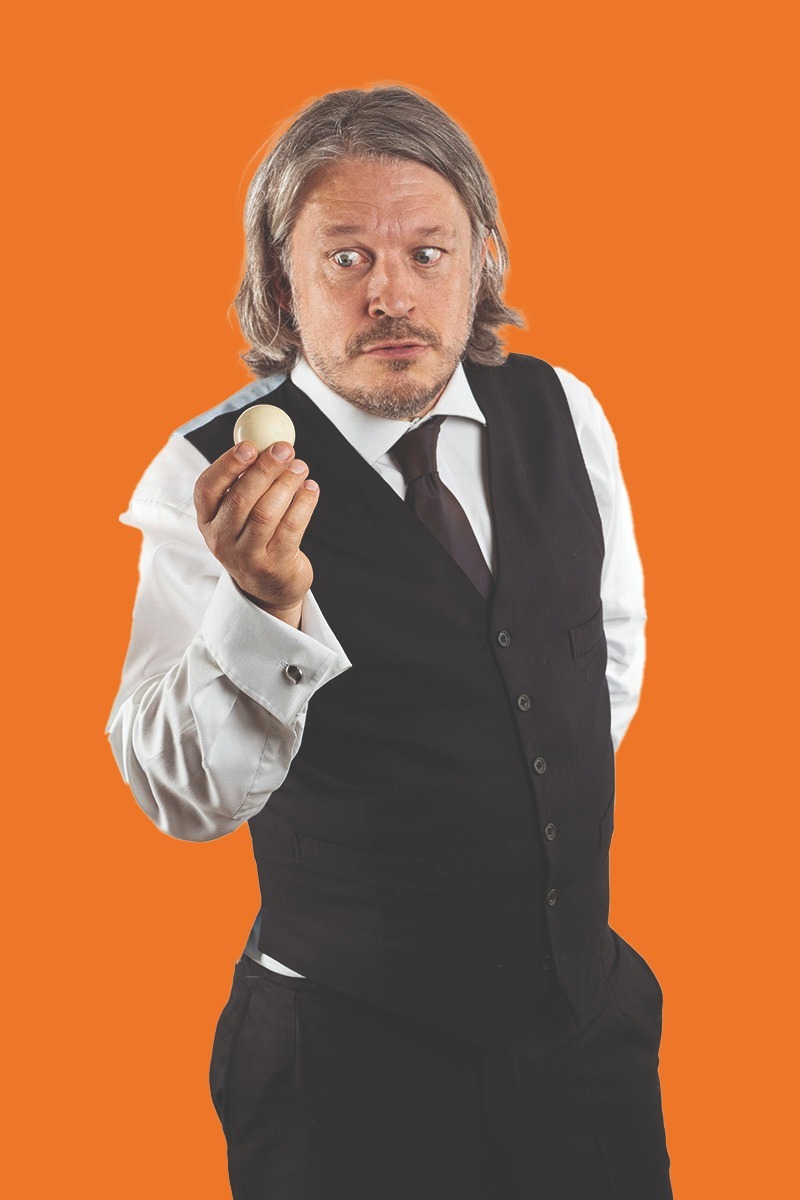How Richard Herring's health scare confirmed his belief that life is precious – and ridiculous

‘‘I hadn’t thought much about testicles before” is a typical line from Richard Herring’s latest stand-up show. In one of the comedian’s many comments on balls, he likens them to backing singers in a band. But unlike many a male comic, Herring has a bona fide excuse to talk about his family jewels: he was diagnosed with testicular cancer in 2021 and his recent show Can I Have My Ball Back? is based on the experience.
I went to see the show at Leicester Square Theatre, where Herring had fun comparing the half-full room with the sold-out shows that ex-double-act-partner Stewart Lee schedules for the same venue. At this point I should give the spoiler: Herring has fully recovered. And lucky for him, a brush with testicular cancer is one of the funnier dances with death, providing him with ample comic material. As he says, the design of the testicles is hopeless: “proof that, if there is a God, he hates us”.
Now 56, Herring giggles his way through a tale of embarrassment, exams and existentialism. When his testicles were the size of a tennis ball and a Ferrero Rocher respectively, he thought he might need a trip to the doctor. Even back then, as he tells me after, he had the thought that if there was something wrong with him, he might turn it into a show. A comic might idly wonder about what jokes they’d do if they lost a leg, for example, or suffered a family tragedy (the “dead dad show” is now a somewhat clichéd Edinburgh Fringe staple), and Herring felt a little annoyed when the GP initially told him it was probably nothing serious. A massive health scare like that, he thought, could have been a gift.
For decades Herring has been a prolific performer, cannibalising his past and his peccadilloes for the amusement of strangers. In Hitler Moustache he grew facial hair in the style of Adolf Hitler as a unique excuse to hold forth on the politics of racism; in Christ on a Bike he compared his life journey to that of Jesus Christ. But his worry about not having a serious health problem turned out to be jumping the gun. After that first conversation there were further appointments and a follow-up call. Fortunately for Herring the comedian, but not for Herring the mortal man, the first GP was wrong: he did, in fact, have testicular cancer.
When Herring got The Call, he remembers registering that he was facing death. Jokes did not come to him in the moment. “I did not want to die,” he tells the audience. He thought of his family first (he has a girl and a boy with fellow comedian Catie Wilkins) but then – selfishly, he said – he began to think about himself and his legacy on this Earth. He was worried, he jokes, that when he died his children might not be old enough to be properly psychologically scarred. He has great fun imagining the man whom Catie would date after his death, enjoying the fancy whisky that he had been foolishly saving for a special occasion.
The best parts of the show are both funny and poignant, as Herring mines his existential experience for material. Wanting to seize what might have been his final moments, he tries to create picture-perfect memories with his kids. They make a snowman in the garden that collects a large amount of cat poo: a truly abysmal sight. He flies a kite with his daughter – the beautiful moment he had been hoping for. He watches the wind picking up and dropping off exactly as it would if he had not been facing the prospect of his death. The world, he realises in a moment of acceptance, doesn’t care about him.
This view is consistent with Herring’s outlook on life. He has been an atheist for a long time, and having a testicle removed did not put the comedian on a path to spirituality. He was brought up in a Christian household but never enjoyed going to church even when he was a believer, he tells me over Zoom from his home in Hertfordshire. When he was seven or eight, while having the Bible read to him, he realised that it didn’t make sense to trace Jesus’s lineage through Joseph, if Joseph wasn’t really Jesus’s dad. When he raised this with his grandma, she couldn’t answer the question. That was the day, he said, that he realised something was off. “In every other branch of study you’re told to question things,” he says. “Why should Christianity be any different?”
Like a lot of atheists, Herring has been preoccupied by religion over the years. If he is wrong about God and ever meets him or her, he says he will make it clear that it was ridiculous for the deity to make people be born with the sin for which he would then judge them. As a humanist he believes that “human beings have the potential to be good to each other and should try to be good to each other without any external force forcing them to do that”. It is laughable, he thinks, to ask people to be good to avoid being burned in a pit.
But almost everything is laughable to Herring, who has been performing comedy since he was a student in the Oxford Revue. For a long time he has believed that humour is the way to treat the things that life hurls at you. When he was a child, people would get annoyed at him for not taking things seriously enough. But if life itself is “intrinsically ridiculous” – partly because of the astronomical odds against any of us even being here – Herring thinks that to treat things seriously isn’t the right way to respond.
“I think humour’s a great way to make points and make people listen,” he says. “If people are laughing, then they’re listening.” In Can I Have My Ball Back? this is more pertinent than ever: Herring is keen to encourage men, usually bad at talking about health problems, to act faster than he did and see a medical professional if they notice any potential symptoms. He thinks that in this regard a comedy show is more effective than a po-faced sexual health campaign.
Herring’s cancer was treated successfully by a national health service for which he is hugely grateful. Unsurprisingly, his brush with mortality changed him. He realised that his family was the most important thing to him. “I’d rather be a good dad than a famous comedian,” he says. “I obviously want to work, and I will … but they [my children] are the priority.” He thinks it is good for everyone involved that he became a dad later in life – he was 47 when his first child was born. Though he knows this means he won’t have as much time with them, he doesn’t think he would have been capable of raising them when he was younger.
The love for a child comes attached to a certain kind of horror, he admits, because you’re constantly terrified that something is going to go wrong. “That fear is what makes it amazing as well,” he says. “It’s such a bizarre kind of love, because it is about that selflessness; it’s a life you’re gonna have to let go. That person you love has to pull away from you, at least for a little while.”
Endings like this are excruciating but important, Herring says. Two things he finds unappetising about the Christian proposition are that in Heaven everyone will live for ever, and the occupants won’t have physical bodies. This doesn’t sound fun, says Herring – as much as his mind entertains him, “most of the fun of being alive is the body.” But more importantly, eternal life makes everything hollow, he thinks. “If you don’t have death there, then everything sort of loses its meaning. The only reason we love anyone or get any joy out of anything is the fact that it’s not gonna go on for ever.”
It’s hard not to be convinced by Herring’s philosophy, which, given how many knob gags are in the show, is deceptively grown-up. We’re not here for long, and we’ll be away for much longer. So why not fly a kite and laugh till you cry? You’ll have a ball.
Visit richardherring.com for details of upcoming shows. This article is from New Humanist’s autumn 2024 issue. Subscribe now.

